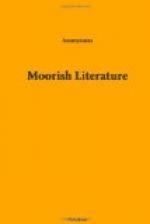But first must cross the wide, wide court,
Ere he can reach his foe.
And he must pass the crowd of men,
Who in the courtyard stand,
Lighting the palace of the Moor,
With torches in their hand.
And Zaida in the midst comes forth,
Her lover at her side;
He has come, amid his groomsmen,
To take her for his bride.
And bold Gazul feels his heart bound
With fury at the sight;
A lion’s rage is in his soul,
His brow is black as night.
But now he checks his anger,
And gently on his steed
Draws near, with smile of greeting,
That none may balk the deed.
And when he reached the bridal,
Where all had taken their stand,
Upon his mighty sword-hilt
He sudden laid his hand;
And in a voice that all could hear
“Base craven Moor,” said he,
“The sweet, the lovely Zaida
Shall ne’er be bride to thee.
And count me not a traitor, I
Defy thee face to face,
Lay hand upon thy scimitar
If thou hast heart of grace.”
And with these words he dealt one stroke,
A cruel stroke and true,
It reached the Moor, it struck his heart
And pierced it through and through.
Down fell the wretch, that single stroke
Had laid him with the dead—
“Now let him die for all his deeds,”
The assembled people said.
Gazul made bravely his defence,
And none could check his flight;
He dashed his rowels in his steed,
And vanished in the night.
GAZUL AND ALBENZAIDE
“Tho’ thou the lance can hurl
as well
As one a reed might cast,
Talk not of courage for thy crimes
Thy house’s honor blast.
Seek not the revel or the dance,
Loved by each Moorish dame.
The name of valor is not thine,
Thou hast a coward’s
name;
And lay aside thy mantle fair
Thy veil and gaberdine,
And boast no more of gold and gems—
Thou hast disgraced thy line.
And see thine arms, for honor fit,
Are cheap and fashioned plain;
Yet such that he whose name is lost
May win it back again.
And Albenzaide keep thy tastes
Proportioned to thy state;
For oft from unrestrained desires
Spring hopes infatuate.
Flee from thy thoughts, for they have
wings,
Whose light ambition lifts
Thy soul to empty altitudes,
Where purpose veers and drifts.
Fling not thyself into the sea,
From which the breezes blow
Now with abrupt disdain, and now
With flattering whispers low.
For liberty once forfeited
Is hard to be regained,
And hardest, when the forfeit falls
On heart and hand unstained.”
Thus spake Gazul, the Moorish lord
Of fame and honor bright;
Yet, as a craven beggar,
Fair Zaida scorned the knight.




